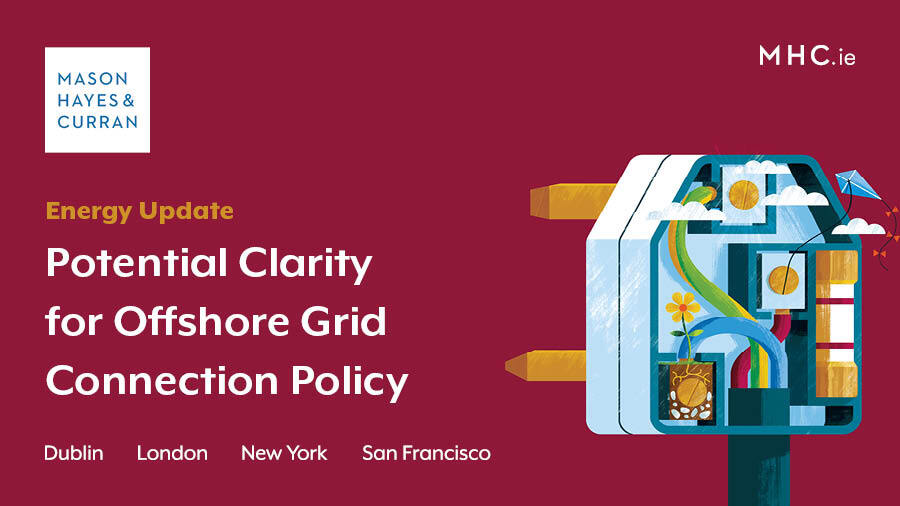Potential Clarity for Offshore Grid Connection Policy

Our Energy team examines how a new step plan to grid connection proposed by the Commission for Regulation of Utilities can potentially provide welcome clarity for developers of Phase 1 offshore wind energy projects that were unsuccessful in Phase 1. In addition, they set out a number of understandable concerns for developers of ORESS 2 projects in light of the proposed decision.
The Commission for Regulation of Utilities' (CRU) proposed decision on grid pathway for Phase 2 offshore wind projects presents potential clarity and quicker access for Phase 1 projects that were unsuccessful in ORESS 1. The proposed decision, entitled "Offshore Grid Connection Pathway - Phase 2", was published on 21 August 2023 under reference CRU202312. The CRU acknowledges that these Phase 1 projects can be seen as “more progressed in terms of planning, surveying etc than many potential Phase 2 projects.”
Fundamental requirement for offshore grid access
For both Phase 1 projects that lack ORESS support, and Phase 2 projects, the proposed decision sets out a mandatory requirement that for connection offers to be processed a project must have:
- Marine Area Consent, or MAC
- Route to Market, and
- Final planning consent from An Bord Pleanála
Phase 1 projects
Earlier this year, from the six projects listed in the ORESS Phase 1 auction results, four projects were successful and two were not. For those unsuccessful projects that do not hold an ORESS 1 Notice of Award, the CRU has proposed a specific step plan to grid connection where these projects are proceeding as "merchant projects" (ie proceeding without a state subsidy):
Phase 1 projects with a Grid Connection Assessment, or GCA, valid until end July 2024 will need to:
- Submit a planning application to An Bord Pleanála no later than the backstop date set out in the MAC, which is the end of June 2024, and
- Confirm a Route to Market to the satisfaction of the MAC Grantor, the Maritime Area Regulatory Authority (MARA), before the end of July 2024.
Following satisfaction of the above criteria, it is proposed that the project can proceed to apply to EirGrid for a Full Connection Offer (FCO).
Phase 2 projects
Prior to the ORESS 2 auction EirGrid will issue Grid Feasibility Scenarios for projects.
Where a Phase 2 project is successful in ORESS 2, it will be entitled to apply for an indicative connection offer from EirGrid and simultaneously apply for its Maritime Area Consent.
To apply for an FCO from EirGrid, a Phase 2 Project will need:
- An ORESS Notice of Award
- A MAC, and
- A final planning consent from An Bord Pleanála
Key concerns on the proposed decision
- For Phase 2 projects, success at ORESS 2 will offer priority access to the grid, albeit one step behind the Phase 1 projects that have a merchant route to market. If unsuccessful, the availability of grid connection on a merchant basis will be at the “earliest stage” and, we would expect, subject to a very uncertain timeline.
- All projects will need to be aware that if their MAC becomes invalid at any stage of the process, the GCA / FCO, as appropriate, will become invalid too.
- The MAC was a pre-requisite for participating in the ORESS 1 auctions. As a result, the two unsuccessful projects from ORESS 1 hold a MAC and the deadline for proceeding with planning was within 18 months of the MAC’s commencement date. Therefore planning applications will need to be submitted by all Phase 1 projects by 28 June 2024 if they have not already done so.
- Validity of GCA: This is only relevant to Phase 1 projects, however, the CRU in this proposed decision has noted the potential requirement for an extension to the validity of the GCAs. The CRU considers that for an extension to be granted, it must be demonstrated that significant progress has been made to connecting on a merchant basis. This can be done through the submission of a planning application to An Bord Pleanála, and “securing an approved route to market from MARA” by the end of July 2024. Failure to do so will result in the invalidity of the GCA.
- Two key outstanding concerns are highlighted in the proposed decision, which interested parties should be aware of. The CRU has noted that clarification on these points may result in a change to CRU’s current thinking on the proposed decision on grid. Those outstanding concerns are that:
- The criteria that MARA will use to assess and approve the route to market is not clear, and
- The Department of the Environment, Climate and Communications' (DECC) eligibility criteria for ORESS 2 has yet to be confirmed.
Next steps
This proposed decision is subject to further changes and amendments. These changes include the process and assessment criteria by which MARA that will approve the route to market as part of the MAC conditions, as well as confirmation by DECC on the eligibility criteria and Terms & Conditions of the Phase 2 auctions.
It presents helpful clarity for Phase 1 projects which were unsuccessful in ORESS 1. However, for ORESS 2 projects, and indeed future phases, it demonstrates the CRU’s thinking on grid access being prioritised to successful ORESS projects.
The deadline for submitting views from interested parties on this proposed decision ends at close of business on Friday 22 September 2023 and the final decision is expected to be published later this year.
For more information on the likely impact of the CRU’s proposed decision on your project, contact a member of our Energy team.
The content of this article is provided for information purposes only and does not constitute legal or other advice.
Share this:




